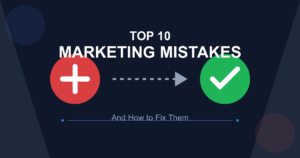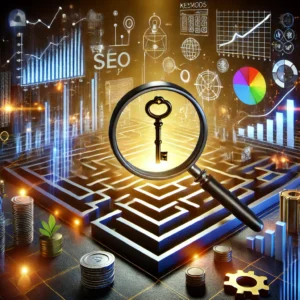AI in Marketing: The Ultimate Strategy to Revolutionize Your Marketing in 2024
The Rising Power of AI in Marketing
Technology has a way of sneaking into every corner of our lives, doesn’t it? From medicine to engineering, business to media, tools have always been humanity’s sidekick—helping us work smarter and faster. The tools we started with were simple, sure, but they paved the way for the dazzling, high-tech systems we rely on today. And now, artificial intelligence (AI) stands front and center as one of the most game-changing advancements yet.
AI might feel like something pulled straight out of a sci-fi movie, but here we are—living the future. Remember all those doomsday predictions about AI taking over human jobs? Turns out, AI didn’t come to replace us—it came to work with us. It’s the Robin to our Batman, the Watson to our Sherlock Holmes, boosting efficiency and unlocking possibilities we never thought possible.
And nowhere is this more evident than AI in marketing. In 2024, AI isn’t just a tech buzzword anymore—it’s the secret weapon driving success in a crowded digital world. Businesses today aren’t just using AI for flashy innovations; they’re using it to streamline processes, craft hyper-targeted campaigns, and build deeper connections with their audiences. AI isn’t just a tool; it’s a marketing ally that turns effort into impact.
But let’s get specific. AI is rewriting the playbook for content and digital marketing strategies. It’s giving marketers the power to predict customer behavior, create ultra-personalized experiences, and transform mountains of data into actionable insights. And the best part? It’s helping brands reach their goals faster and smarter than ever before.
In this article, we’re diving into the practical ways AI is reshaping marketing. From real-world examples to actionable strategies, we’ll explore how you can harness the power of AI to stay ahead of the curve in 2024.
What is AI in Marketing?
Imagine having a marketing assistant who never sleeps, constantly analyzes data, and knows exactly what your audience wants—before they even ask for it. That’s AI in marketing. At its heart, AI uses machine learning, natural language processing, and other technologies to handle repetitive tasks, tailor customer experiences, and supercharge your campaigns. It’s not just about working harder; it’s about working smarter.
AI allows marketers to sift through mountains of data at lightning speed, uncovering insights that would take a human team days (or even weeks) to find. The result? Better decisions, sharper strategies, and campaigns that hit closer to the mark every time.
Here are some of the key players in AI-powered marketing:
- Personalization Engines: These tools make every customer feel like the only customer. By analyzing behavior, preferences, and history, they deliver tailored content and product recommendations that resonate.
- Chatbots and Virtual Assistants: Need to answer a customer’s question at midnight? No problem. These AI-driven tools provide instant responses, keeping your audience engaged and supported 24/7.
- Predictive Analytics: Think of this as a crystal ball for marketers. By studying past behaviors, AI can predict future trends, helping businesses anticipate customer needs and fine-tune their efforts.
- Content Creation Tools: Generating engaging content at scale is no small feat, but AI makes it look easy. From crafting snappy social media posts to drafting full-length blog articles, these tools ensure your messaging stays relevant and impactful.
In short, AI in marketing isn’t just a tool—it’s the key to delivering meaningful, personalized experiences in a way that was impossible just a few years ago. It’s how brands stay ahead in a world that’s always moving faster.
AI in Marketing: Why it is Essential for Digital Marketing in 2024
In 2024, AI in marketing isn’t just a trend—it’s a necessity. As customer expectations skyrocket, the demand for hyper-personalized, data-driven experiences has reached new heights. Gone are the days when a one-size-fits-all approach worked. Today’s consumers want tailored interactions, meaningful content, and real-time solutions.
So, how do marketers meet this demand without burning out? AI is the answer. By analyzing vast amounts of data at lightning speed, AI empowers marketers to deliver the right message, to the right person, at the right time—on a scale that would be impossible for humans to achieve manually.
Think about it: AI helps marketers understand not just who their customers are, but what they want, when they want it, and how they want to receive it. This allows for dynamic, highly targeted campaigns that feel personal—whether it’s a customized shopping recommendation, a tailored email offer, or a unique piece of content that speaks directly to a customer’s interests.
Why AI is Essential:
- Data-Driven Insights: AI helps sift through mountains of customer data to uncover patterns and trends, enabling marketers to make smarter, more informed decisions.
- Scale and Efficiency: Where traditional methods might take weeks to analyze data, AI provides near-instant insights, making large-scale personalization not only possible but practical.
- Continuous Learning: AI algorithms learn from every interaction, getting smarter with every click, purchase, or conversation, which means campaigns become more effective over time.
In short, AI is no longer just a tool in the marketer’s toolbox—it’s the foundation upon which successful digital marketing strategies are built. In 2024, brands that embrace AI in marketing will be the ones that meet, and exceed, customer expectations, creating experiences that feel intuitive, relevant, and engaging.
AI in Marketing: Key Tools Revolutionizing Marketing in 2024
In 2024, AI in marketing is no longer a futuristic concept—it’s a necessity. The tools powered by artificial intelligence are reshaping how brands create, share, and optimize their content, offering marketers an edge in the ever-competitive digital landscape.
Take AI-driven content marketing solutions, for example. Tools like Jasper, Copy.ai, and Writesonic are game-changers, leveraging machine learning to produce everything from blog posts and product descriptions to social media captions. These tools don’t just save time; they ensure marketers can meet the growing demand for fresh, high-quality content without compromising on creativity.
Here’s how these tools are making waves:
- Speed and Scalability: Need thousands of pieces of content? No problem. These AI tools can generate large volumes of copy in record time, freeing marketers to focus on strategy rather than production.
- Enhanced Relevance: By analyzing customer preferences and trends, AI ensures the content resonates with its target audience, driving engagement and conversions.
A well-known e-commerce brand turned to Jasper to handle product descriptions for over 5,000 items. In just a few weeks, the AI-powered tool delivered copy that was not only accurate but also engaging. The result? A 30% increase in conversion rates, proving that AI in marketing isn’t just efficient—it’s effective.
As AI tools continue to evolve, they’re not just helping marketers keep up with demand—they’re setting a new standard for what’s possible in the digital age. Whether it’s automating repetitive tasks or creating personalized customer experiences, these tools are revolutionizing marketing one innovation at a time.
AI in Predictive Analytics
One of the most powerful applications of AI in marketing is predictive analytics. By diving deep into past behaviors and uncovering patterns, AI equips businesses with the ability to predict what customers are likely to do next. This isn’t just a nice-to-have—it’s a game-changer. Predictive analytics helps marketers fine-tune their strategies, delivering campaigns and messages that feel tailor-made for every individual.
How does it work? AI sifts through mountains of data at lightning speed, identifying trends that even the most skilled human analyst might miss. This insight allows brands to take proactive steps, ensuring that their marketing efforts are always one step ahead. Whether it’s suggesting the next product a customer might love or timing an email campaign perfectly, predictive analytics turns guesswork into precision.
Take Spotify, for instance. Using AI-driven predictive analytics, the platform curates personalized playlists for its users based on listening history and behavior. The result? An enhanced user experience and skyrocketing engagement. Some of these AI-curated playlists boast a 40% higher engagement rate compared to generic ones—a testament to the power of prediction in marketing.
In 2024, leveraging AI in predictive analytics isn’t just about staying competitive; it’s about redefining what’s possible in customer engagement. The brands that embrace this technology are the ones that not only meet customer expectations but exceed them.
AI Chatbots and Customer Support Automation
AI in marketing isn’t just about data and analytics—it’s also about transforming how businesses connect with their customers. One standout application? AI chatbots and customer support automation. These tools have revolutionized customer service by offering instant, round-the-clock assistance without the need for a human representative.
How do they work? AI chatbots use natural language processing (NLP) to understand customer queries and provide accurate, conversational responses. Whether it’s answering frequently asked questions, guiding users through a website, or resolving basic issues, these bots ensure customers get the support they need—fast.
Why Marketers Love Them:
- 24/7 Availability: Chatbots don’t take coffee breaks. They’re always online, ensuring customers are never left waiting for answers.
- Scalability: Whether serving 10 customers or 10,000, AI chatbots handle it all with ease, making them perfect for businesses of any size.
- Personalization: Advanced bots can use customer data to tailor interactions, offering solutions and suggestions that feel genuinely helpful.
E-commerce giant H&M uses AI chatbots to assist customers with style advice and product recommendations. By analyzing user preferences and past purchases, the chatbot provides personalized shopping suggestions, driving both customer satisfaction and sales.
In 2024, customer support automation is a cornerstone of AI in marketing, helping brands save time, cut costs, and enhance the customer experience. These tools aren’t just about efficiency—they’re about building stronger, more meaningful connections with customers.
Benefits of AI in Marketing
When it comes to AI in marketing, the benefits are clear—and they go beyond just “cool tech.” AI is making real, measurable impacts on businesses by streamlining operations, enhancing customer experiences, and delivering a stronger return on investment.
Increased Efficiency and Cost Savings: The first and most obvious benefit of AI is its ability to automate repetitive tasks. From scheduling social media posts to managing email campaigns, AI-powered tools take over the mundane, freeing up marketing teams to focus on what really matters: strategy and creativity. With less time spent on manual work, businesses can drive efficiency, reduce overhead costs, and improve productivity.
Improved Personalization: AI takes personalization to a whole new level. By analyzing massive amounts of data, AI helps marketers deliver content that speaks directly to the customer’s needs, preferences, and behaviors. Whether it’s recommending products on an e-commerce site or crafting tailored email campaigns, AI ensures the right message reaches the right person at the perfect time—driving higher engagement and, ultimately, conversions.
Take Amazon’s recommendation engine. Powered by AI, it’s responsible for over 35% of Amazon’s total revenue. By analyzing everything from browsing history to purchase behavior, Amazon creates a personalized shopping experience that keeps customers coming back for mo
Measurable ROI: AI doesn’t just help marketers get more done—it helps them make better decisions. With AI-driven analytics, businesses can track the performance of their campaigns in real-time, identify what’s working, and tweak what’s not. Predictive analytics can also assist in budget allocation, ensuring that marketing dollars are spent on the most profitable channels. This isn’t just about efficiency—it’s about maximizing impact.
Coca-Cola harnessed the power of AI to optimize its digital advertising campaigns. By analyzing customer behavior and adjusting targeting strategies, Coca-Cola boosted its ad ROI by 25%, proving that with AI, smarter decisions lead to bigger results.
In 2024, the benefits of AI in marketing are undeniable. It’s a tool that brings efficiency, personalization, and measurable success, making it an essential part of any modern marketing strategy.
Practical Implementation Steps for AI in Marketing
Step 1: Identify Your Business Needs
Before implementing AI in marketing, businesses should evaluate their specific needs and goals. Are you looking to improve customer engagement? Automate content creation? Optimize email campaigns? Understanding the desired outcome will help you choose the right AI tools.
Step 2: Choose the Right AI Tools
Once you’ve identified your needs, it’s time to select the AI tools that best suit your business. For content creation, tools like Jasper and Copy.ai may be a good fit. For predictive analytics, platforms like HubSpot and Google Analytics offer AI-driven insights. Chatbot platforms like Intercom or Drift can streamline customer support.
Step 3: Integrate AI into Your Workflow
Integrating AI tools into your marketing workflow is crucial for maximizing their potential. Ensure your team is trained to use the tools effectively and that they are aligned with your broader marketing strategy. Automation should enhance human creativity, not replace it.
Step 4: Measure and Optimize
Finally, always track the performance of AI-powered campaigns. Use AI analytics to monitor KPIs, test different strategies, and continually optimize your campaigns for better results. Remember, AI’s strength lies in its ability to learn and improve over time.
AI in Marketing: Real-World Success Stories
Case Study 1: Starbucks’ AI-Driven Personalization
Starbucks uses AI to drive its “Personalized Offers” program, which sends tailored promotions to customers based on their purchase history. This strategy has significantly increased customer retention, with customers who receive personalized offers spending 5-10% more per visit compared to those who don’t.
Case Study 2: Nike’s Use of AI for Product Recommendations
Nike uses AI-powered product recommendation engines on its website and app to suggest shoes and apparel based on customers’ past purchases and browsing behavior. This has resulted in a 30% increase in conversion rates and a more personalized shopping experience for users.
AI in Marketing: Future Trends and Predictions
Looking ahead, AI in marketing will continue to evolve. Key trends to watch include:
- Hyper-Personalization: AI will enable even more personalized experiences, tailoring every aspect of a customer’s journey based on real-time data.
- Voice Search Optimization: With the rise of virtual assistants like Alexa and Google Assistant, optimizing content for voice search will become increasingly important.
- AI-Powered Video Content: AI tools that automate video creation and editing will transform content marketing strategies, especially on platforms like YouTube and Instagram.
Conclusion: The Road Ahead for AI in Marketing
AI in marketing is no longer a futuristic concept—it’s a present-day reality that offers businesses the opportunity to streamline their processes, deliver personalized experiences, and achieve higher ROI. By embracing AI tools and strategies, businesses can stay ahead of the competition and keep their marketing efforts aligned with consumer expectations.
At BrightLine Digital Marketing Agency, we harness the power of AI in marketing to help your business reach new heights. From hyper-personalized content to data-driven strategies that drive real results, we’re here to make your marketing smarter, faster, and more effective.






